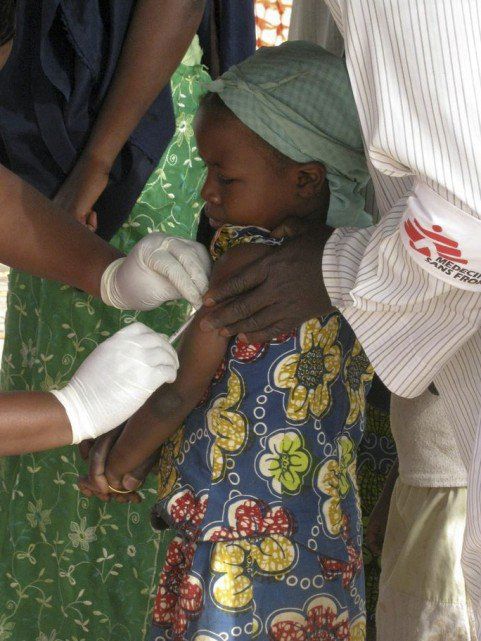Nearly 400,000 children and young adults have been recently vaccinated against meningococcal meningitis in Zinder, Maradi and Madaoua localities. MSF is supporting the Ministry of Health with the organisation and logistics of the vaccination campaign, which ran from the 13th to the 25th of April.
The drastic rise in meningitis cases reported by the authorities in the regions of Zinder, Maradi and Tahoua resulted in the timely decision by the Ministry of Health to launch a mass vaccination campaign. An agreement with the International Coordinating Group (ICG) on vaccine provision for epidemic meningitis control enabled the swift acquisition of enough doses to vaccinate 400,000 people in Niger.
The serotype of the meningococcal strain responsible for this year’s meningitis epidemic is W135, as opposed to the A and C strains which caused a massive outbreak in West Africa last year. In 2009, approximately 3 million people in Niger were vaccinated against the A and C strains with the support of MSF.
Once again this year, MSF has responded to the request of the health authorities to assist with the logistics and organisation of the campaign, in addition to supporting the medical treatment of the people affected by the disease and by installing an isolation unit in the referral hospitals.
“This new vaccine offers protection from the meningitis strains A, C and W135 for the next 3 years,” specifies Clara DELACRE, MSF vaccination coordinator for the region of Maradi and Madaoua. “We administer vaccinations free of charge to people aged from 2 to 30 years old.”
174,000 children and young adults between the ages of 2 and 30 were vaccinated in Zinder, 156,000 were vaccinated in Maradi and 61,400 people were vaccinated in Madaoua.
Meningococcal meningitis is a bacterial form of meningitis, a serious infection of the thin lining that surrounds the brain and spinal cord. Bacteria are transmitted between humans through droplets of respiratory secretions when in close contact. The most common symptoms are a stiff neck, high fever, sensitivity to light, headaches and vomiting. If left untreated, meningococcal meningitis is fatal in approximately 50% of cases. The meningitis belt, which stretches from Senegal to Ethiopia, has the highest rates of the deadly disease worldwide.
The drastic rise in meningitis cases reported by the authorities in the regions of Zinder, Maradi and Tahoua resulted in the timely decision by the Ministry of Health to launch a mass vaccination campaign. An agreement with the International Coordinating Group (ICG) on vaccine provision for epidemic meningitis control enabled the swift acquisition of enough doses to vaccinate 400,000 people in Niger.
The serotype of the meningococcal strain responsible for this year’s meningitis epidemic is W135, as opposed to the A and C strains which caused a massive outbreak in West Africa last year. In 2009, approximately 3 million people in Niger were vaccinated against the A and C strains with the support of MSF.
Once again this year, MSF has responded to the request of the health authorities to assist with the logistics and organisation of the campaign, in addition to supporting the medical treatment of the people affected by the disease and by installing an isolation unit in the referral hospitals.
“This new vaccine offers protection from the meningitis strains A, C and W135 for the next 3 years,” specifies Clara DELACRE, MSF vaccination coordinator for the region of Maradi and Madaoua. “We administer vaccinations free of charge to people aged from 2 to 30 years old.”
174,000 children and young adults between the ages of 2 and 30 were vaccinated in Zinder, 156,000 were vaccinated in Maradi and 61,400 people were vaccinated in Madaoua.
Meningococcal meningitis is a bacterial form of meningitis, a serious infection of the thin lining that surrounds the brain and spinal cord. Bacteria are transmitted between humans through droplets of respiratory secretions when in close contact. The most common symptoms are a stiff neck, high fever, sensitivity to light, headaches and vomiting. If left untreated, meningococcal meningitis is fatal in approximately 50% of cases. The meningitis belt, which stretches from Senegal to Ethiopia, has the highest rates of the deadly disease worldwide.



